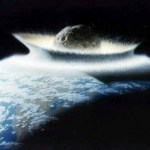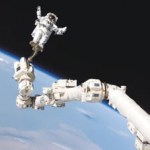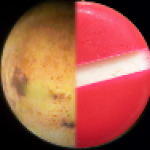Astronomy
It seems that astrometry has finally succeeded at detecting a planet. A star and its planets perform a complex dance as they move through space. In astrometry planet hunting one looks for a planet by looking for the "wobble" of a star as it moves across the sky. This is contrast with the two other methods used to detect planets around stars, which use radial velocity or transits to detect the planets. Now it seems that a team from JPL has used a series of measurements over 12 years to detect a Jupiter sized planet tugging on its star, VB 10. The wobble in this case is a movement of about…
One of the scariest things that could happen to Earth is to be bombarded with an asteroid or comet, as the potential for damage is incredible.
Well, it turns out that we get hit by tiny "space pebbles" all the time. Every time you see a shooting star, like the one below, it's actually a very small rock, often the size of a mere grain of sand, streaking through the Earth's atmosphere and disintegrating. The heat of vaporization is so intense that the object glows brighter than the stars in the sky, and -- however briefly -- these grains of sand and dust can outshine even the planets.
A…
It's Memorial Day weekend, and I won't be blogging over it, as I'm going to be enjoying my long weekend! (And I hope you are, too.) But I'd like to leave you with some reflections on our history of Space Exploration in this country. (This was originally posted last year.)
There are wonderful things going on in Space Exploration these days, and we know an unprecedented amount about our planet, solar system, galaxy, and Universe as a result of all the exploration that we've done. In fact, that's most of what I write about here. But another huge part of that exploration has been manned…
Every once in awhile, I'll get an email from someone curious about getting into amateur astronomy, but with no idea where to begin. More often than not, it's from someone with a crappy telescope who's trying to salvage some utility out of a bad purchase/gift.
The truth of the matter is that most telescopes either cost a lot for automated, easy-to-use features, or require a lot of time and effort to learn to use them properly.
But lets say you'd like to start exploring the skies, and need some help with where to begin. If you're like most people, and not sure how seriously you're going to be…
It was May, 1992, and I was in a stupor of post thesis-completion cortisol letdown and alcohol-induced lethargy, and Mark Pagel was talking to me as I slouched in a large comfortable chair in the Peabody Museum's smoking lounge.
"It's obvious what they need to do," he was saying, and I could tell from the look on his face, even in my foggy state of mind, that a morsel of wisdom marinated in humor was about to be served up.
I swear this stuff works great. "Hrmphsmeh," I replied, indicating that he should continue, I was interested.
"They need Ross Perot."
"Hrmph???," I knew Mark (and…
This post is written in response to the contest I posted on my Twitter feed earlier today:
SciencePunk challenge: give me two unrelated topics and I will attempt to write a blog post combining them. Your time starts now.
Of several excellent and perplexing replies, I decided to seize the gauntlet thrown down by Martin of The Lay Scientist blog:
@SciencePunk Pigs, and the flu. No? Oh alright... erm... Mars and cheese.
So here it is Martin!
* * *
If you heard the words "time reversal technology" you'd be forgiven for thinking it was a plot point from the new Star Trek movie. Yet across the…
Swiss astronomers recently discovered the small exoplanet, Gliese 581 e, calculated to have a minium mass less than twice that of our own dear planet. This planet resides within the same solar system as Gliese 581 d, which scientists speculate could be capable of supporting life. "With a minimum age of these planets of 7 billion years, you can bet that if life did form there, it's probably awfully interesting by now," ventured ScienceBlogger Ethan Siegel from Starts With a Bang.
Related ScienceBlogs Posts:
Say Hello to my Little Rocky Friend!
Two Earth Mass Planet
"It's Life, Jim, But Not…
Today is Earth Day, and here on ScienceBlogs our bloggers are observing it by sharing their reasons for caring about our planet and its environment. ScienceBlogs' newest blog, Guilty Planet, launched today in timing with the occasion. Written by Jennifer Jacquet, formerly of Shifting Baselines, the blog will explore human patterns of consumption and what can be done to make them sustainable. "It will seek reason amidst the irrational madness of destroying one's only home," writes Jacquet. Also check out Mike Dunford's Earth Day meme on The Questionable Authority and a meditative audio…
tags: Astropeep, peeponaut, easter, space, streaming video
I posted this last year, but I think it is worth repeating .. this streaming video lacks music, but it shows you the adventures of a special peep, an astropeep (or a peeponaut, depending upon which name you prefer) who traveled to the edge of space .. thanks to the Adler Planetarium's "Far Horizons 12" high altitude balloon mission, which rose to nearly to 97,000 feet [3:00]
Originally posted by Janet Stemwedel
On March 26, 2009, at 11:58 AM
What is it like to be a woman scientist? In a society where being a woman is somehow a distinct experience from being an ordinary human being, the answer to this question can be complicated. And, in a time and place where being a scientist, being a professional -- indeed, even being American -- was still being worked out, the complexities of the answer can add up to a biography of that time, that place, that swirl of intellectual and cultural ferment, as well as of that woman scientist.
The astronomer Maria Mitchell was not…
Nothing else matters today. Nothing except what is going to happen in the very last episode of Battlestar, which has been running since 2004 and now culminates in a two hour extravaganza. We know the Battlestar is about to jump into the Cylon colony to rescue Hera, the human-Cylon hybrid child, and to make a last stand with guns blazing...what the frak is going to happen?
This thread is for you, nerds of the universe....
Phil Plait over at Bad Astronomy posted this terrific piece that started off my Saturday with a smile. It reads like The Onion, though I also can't find the original source. Take a look and see if you agree that author Michael Haber might be onto something...
Emboldened by their success in declaring Pluto not a
planet, the International Astronomical Union determined this week by a
close vote that February is too short to be considered a true month. It
has, however, been granted the newly created status of "dwarf month."
It shares this dubious distinction with several other calendar time…
Originally posted by Mike Dunford
On March 6, 2009, at 8:24 AM
A few weeks ago, I read, enjoyed, and reviewed Phil Plait's Death From the Skies. After I caught my daughter looking at the book a couple of times, I managed to bribe convince her to write a review of the book. The result is the following review. I fixed the formatting a little bit, but I had absolutely no role in the development of the text.
Death From the Skies
When I got death from the skies I thought that it would be about people getting an unpleasant visit from flaming meteors, I was wrong. It was about the ways the world…
Some time ago, I wrote about the awesome things the Greeks did in astronomy. Basically they calculated the size of the Earth, distance and size of the moon and distance and size of the sun. The value obtained for the distance to the sun was a bit off, but still a bang up job if you ask me. (where bang-up is meant as a good thing) If the greeks were in my introductory physics lab, they would need to include uncertainties with their measurements. What would the uncertainty in the final value look like?
In my introductory physics lab course, I have students measure things and estimate the…
I LOVE all things space--arguably more than the next girl. For years I wanted to be an astrobiologist. Infinite possibilities and the ultimate opportunity to explore the unknown. And it's no secret to readers that I adore Carl Sagan and Cosmos, which fostered a love and appreciation of science in so many of us.
All I'm saying is, just perhaps--for the time being--we might be better off spending the kind of figures currently invested in large scale BIG 'what if?' projects on more proximate concerns. No doubt the mission of Kepler is really cool, but why rush to search for planets like…
Mark your calendars for the launch of ASU's new Origins Initiative on April 6, 2009. Tickets go on sale next week and the event will be broadcast live online. It looks like a terrific line up including Stephen Hawking, Steven Pinker, Brian Greene, and new Director, (and Science Debate co-founder) Lawrence Krauss.
The Origins Symposium will inaugurate the new Origins Initiative at ASU, which will be a University-wide transdisciplinary endeavor supporting research building on key areas of strength at ASU including: the origin of the universe, origins of stars and planet, the origins of life,…
I'll admit PZ's post yesterday featuring a cosmic cephalopod sleeping overhead in the Carina Nebula was both daunting and impressive... but never fear friends, a heroic starry sea cucumber keeps vigilant in the Crab Pulsar and continues to protect us from its merciless tentacles.
Originally posted by Mike Dunford
On February 18, 2009, at 2:01 PM
"Children are our hope for the future."
THERE IS NO HOPE FOR THE FUTURE, said Death.
"What does it contain, then?"
ME.
"Besides you, I mean!"
Death gave him a puzzled look. I'M SORRY?
---Terry Pratchett, Sourcery
Bad Astronomy Blogger Phil Plait has written one of the most fantastically, outrageously, manically, humorously depressing books I've ever read, and I'm almost certain I mean that as a compliment. Death From The Skies provides a veritable smorgasbord of potentially deadly astronomical delights, each more exotic than…
In this week's Science Saturday, blogger and astronomer Phil Plait chats with science journalist Carl Zimmer. They talk about the time Buzz Aldrin punched a moon-landing denialist in the face, how consumer-culture gadgetry can serve the cause of science, the death of newspapers in the Internet age, and the big questions in astronomy that Phil hopes we'll have answers for soon.
Man, Copernicus has been kicking my butt. All the star tables, geometry, etc were turning me in to a pumpkin. So I pulled down a secondary source--Kuhn's The Copernican Revolution--and night became day. I honestly think one of the reasons that Kuhn's later and more famous book, The Structure of Scientific Revolutions, had such a dramatic impact is that the author wrote and expounded so clearly.
I don't know what I was expecting from Copernicus, but Kuhn's book (so far) helpfully explains the relationship between the highly technical and the broad and general in the Copernican Revolution. As…



